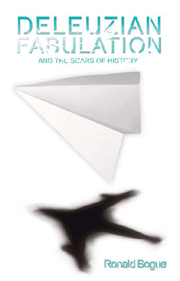Book contents
- Frontmatter
- Contents
- Acknowledgements
- Introduction
- 1 The Concept of Fabulation
- 2 Becoming-Prophet: Zakes Mda's The Heart of Redness
- 3 Becoming-Child, Becoming-Untouchable: Arundhati Roy's The God of Small Things
- 4 Becoming-Memory: Roberto Bolaño's Amulet
- 5 Becoming-Woman, Becoming-Girl: Assia Djebar's So Vast the Prison
- 6 Becoming-Fish: Richard Flanagan's Gould's Book of Fish
- Conclusion
- Bibliography
- Index
- Miscellaneous Endmatter
5 - Becoming-Woman, Becoming-Girl: Assia Djebar's So Vast the Prison
Published online by Cambridge University Press: 12 September 2012
- Frontmatter
- Contents
- Acknowledgements
- Introduction
- 1 The Concept of Fabulation
- 2 Becoming-Prophet: Zakes Mda's The Heart of Redness
- 3 Becoming-Child, Becoming-Untouchable: Arundhati Roy's The God of Small Things
- 4 Becoming-Memory: Roberto Bolaño's Amulet
- 5 Becoming-Woman, Becoming-Girl: Assia Djebar's So Vast the Prison
- 6 Becoming-Fish: Richard Flanagan's Gould's Book of Fish
- Conclusion
- Bibliography
- Index
- Miscellaneous Endmatter
Summary
Assia Djebar (the pen-name of Fatima-Zohra Imalayen) is Algeria's greatest woman writer and a major presence in contemporary French literature. She is the recipient of numerous prizes and awards, and in 2006 was elected to the Académie Française, the first North African writer so distinguished, and only the second African to join this body (the first being Léopold Sédar Senghor, elected in 1983). Her 1995 novel, So Vast the Prison (Vaste est la prison), is among her finest achievements, a lyrical, at times poetic, semi-autobiographical text that combines multiple narratives and reflective commentary to explore the tangled networks of language, gender and history that inform her past and her practice as a writer. She has spoken of the novel as an exercise in ‘anamnesis’, an effort to overcome the amnesia of feminine memory and restore a usable feminine past. She has also stated that the work, written in a short burst in 1994, ‘although not at all a novel about current events [sur l'actualité], was my confrontation with this risk of the destruction of Algeria, with this shattering of a country’ (interview in Gauvin 1997: 18), a collapse she deemed possible in the wake of the increasing violence manifest in Algeria in the 1990s. Her novelistic ‘un-forgetting’ of an occulted past and her confrontation with a perilous national present take her as far back as the fall of Carthage and forward through two millennia of subterranean linguistic and gender memories. Her own becoming-other as a writer is one with her becoming-woman within a rigidly gender-structured society.
- Type
- Chapter
- Information
- Deleuzian Fabulation and the Scars of History , pp. 132 - 172Publisher: Edinburgh University PressPrint publication year: 2010



